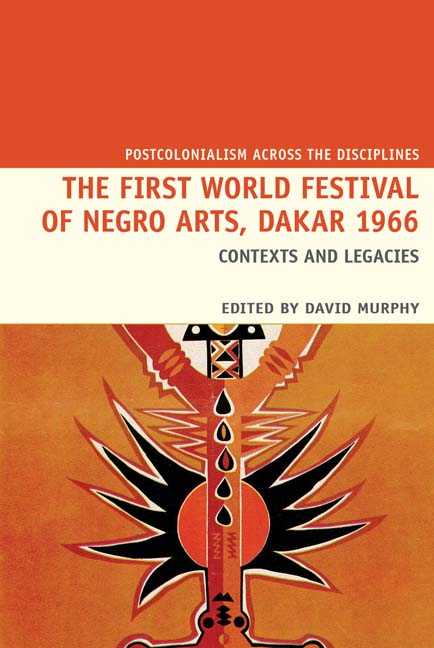Book contents
- Frontmatter
- Contents
- Acknowledgements
- List of Figures
- Notes on Contributors
- Introduction. The Performance of Pan-Africanism: Staging the African Renaissance at the First World Festival of Negro Arts
- I Contexts
- 1 ‘The Real Heart of the Festival’: The Exhibition of L'Art nègre at the Musée Dynamique
- 2 Dance at the 1966 World Festival of Negro Arts: Of ‘Fabulous Dancers’ and Negritude Undermined
- 3 Staging Culture: Senghor, Malraux and the Theatre Programme at the First World Festival of Negro Arts
- 4 Making History: Performances of the Past at the 1966 World Festival of Negro Arts
- 5 ‘The Next Best Thing to Being There’: Covering the 1966 Dakar Festival and its Legacy in Black Popular Magazines
- II Legacies
- Books and Films about the 1966 Festival
- Bibliography
- Index
5 - ‘The Next Best Thing to Being There’: Covering the 1966 Dakar Festival and its Legacy in Black Popular Magazines
from I - Contexts
- Frontmatter
- Contents
- Acknowledgements
- List of Figures
- Notes on Contributors
- Introduction. The Performance of Pan-Africanism: Staging the African Renaissance at the First World Festival of Negro Arts
- I Contexts
- 1 ‘The Real Heart of the Festival’: The Exhibition of L'Art nègre at the Musée Dynamique
- 2 Dance at the 1966 World Festival of Negro Arts: Of ‘Fabulous Dancers’ and Negritude Undermined
- 3 Staging Culture: Senghor, Malraux and the Theatre Programme at the First World Festival of Negro Arts
- 4 Making History: Performances of the Past at the 1966 World Festival of Negro Arts
- 5 ‘The Next Best Thing to Being There’: Covering the 1966 Dakar Festival and its Legacy in Black Popular Magazines
- II Legacies
- Books and Films about the 1966 Festival
- Bibliography
- Index
Summary
One of the ironies of cultural pan-Africanism is that while its broadly leftist discourse of liberation might suggest that non-elite workers would figure prominently in its projects, very few of the participants in its conferences, congresses and festivals came from beyond the ranks of intellectuals, politicians or prominent artists. Indeed, the First World Festival of Negro Arts (FESMAN) of 1966, and the subsequent pan-African festivals of 1969 (Algiers) and 1977 (Lagos), all privileged artists and cultural workers with the means and governmental support to travel. This chapter explores how popular African and African American glossy print magazines allowed less elite participants to follow the festivals from their own homes. The chapter examines selected issues of Bingo (based in Paris and Dakar and distributed throughout the Francophone world), the three Johnson Company magazines based in the USA, Ebony, Jet and Negro Digest, and the Nigerian edition of Drum magazine, which covered FESTAC in Lagos in 1977.It focuses specifically on these popular magazines rather than the coverage and responses in more literary publications like Transition and Présence Africaine in an effort to consider audiences beyond the ‘usual suspects’ of educated and politically engaged readers.
This discussion of popular magazine coverage seeks to uncover how the digest form of illustrated magazines exposes the way the festival tapped into not only pan-African feeling but also a particular idea of culture as an industry, and by extension cultural events as consumable commodities. These magazines featured stories that wrote back to and against official state agendas, and revealed the rich and sometimes fractious parallel conversations to those in the sanctioned halls of the symposia and colloquia that accompanied each festival. They remind us that the cultural festival is a form that is necessarily messy, noisy, crowded and contentious. Indeed, such live events would seem to offer a forum for the very opposite of unity. However, as the magazine coverage surveyed below shows, such struggles over meaning and accidental encounters were no mere example of ‘message creep’ but rather opened up to non-elite parties and sceptical commentators those fissures in the stated agendas of official organizers where the real work of solidarity began.
- Type
- Chapter
- Information
- The First World Festival of Negro Arts, Dakar 1966Contexts and legacies, pp. 123 - 140Publisher: Liverpool University PressPrint publication year: 2016



